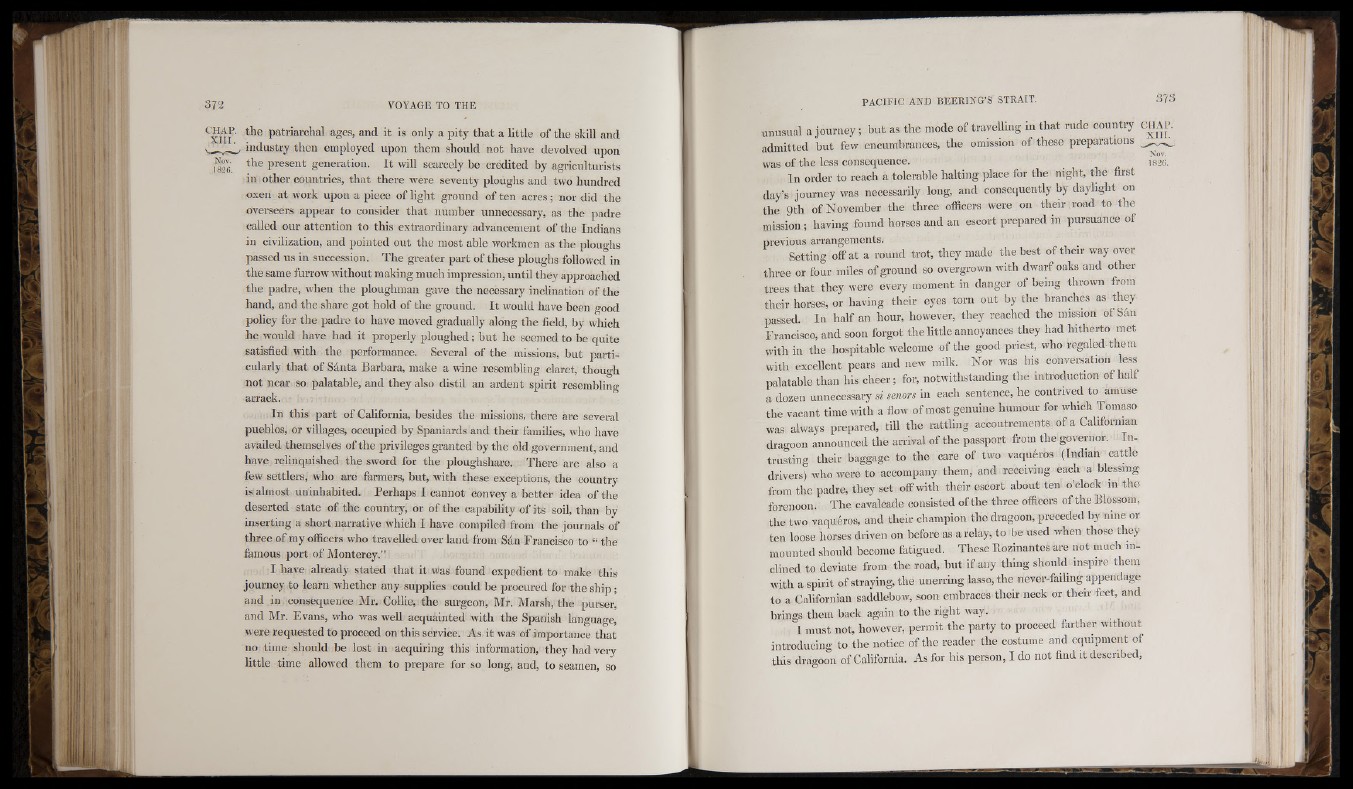
m ; i
ú i ■
T / í f' patriarchal ages, and it is only a pity that a little of the skill and
industry then employed upon them should not have devolved upon
1826 present generation. It will scarcely be credited by iigrieulturists
in other countries, that there were seventy ploughs and two hundred
oxen at work upon a piece of light ground often acres; nor did the
overseers appear to consider that number unnecessary, as the padre
called our attention to this extraordinary advancement of the Indians
in civilization, and pointed out the most able workmen as the ploughs
passed us in succession. The greater part of these ploughs followed in
the same furrow without making much impression, until they approached
the padre, when the ploughman gave the necessary inclination of the
hand, and the share got hold of the ground. It would have been good
policy for the padre to have moved gradually along the field, by which
he would have had it properly ploughed; but he seemed to be quite
satisfied with the performance. Several of the missions, but particularly
that of Sánta Barbara, make a wine resembling claret, though
not near so palatable, and they also distil an ardent spirit resembling
arrack.
In this part of California, besides the missions, there are several
pueblos, or villages, occupied by Spaniards and their families, who have
availed themselves of the privileges granted by the old government, and
have rehnquished the sword for the ploughshare. There are also a
few settlers, who are farmers, but, with these exceptions, the country
is almost uninhabited. Perhaps I cannot convey a better idea of the
deserted state of the country, or of the capability of its soil, than by
inserting a short narrative which I have compiled from the journals of
three of my officers who travelled over land from Sán Francisco to “ the
famous port of Monterey.”
I have already stated that it was found expedient to make this
journey to learn whether any supplies could be procured for the ship;
and in consequence Mr. Collie, the surgeon, Mr. Marsh, the purser,
and Mr. Fvans, who was well acquainted with the Spanish language,
w ere requested to proceed on this service. As it was of importance that
no time should be lost in acquiring this information, they had very
little time allowed them to prepare for so long, and, to seamen, so
unusual a journey ; but as the mode of travelling in that rude country C H A P ,
admitted but few encumbrances, the omission of these preparations '
Nov.
was of the less consequence.
1826.
In order to reach a tolerable halting place for the night, the first
day’s journey was necessarily long, and consec¡uently by daylight on
the 9th of November the three officei-s were on their road to the
mission ; having found horses and an escort prepared in pursuance of
previous arrangements.
Setting off at a round trot, they made the best of their way over
three or four miles of ground so overgrown with dwarf oaks and other
trees that they were every moment in danger of being thrown from
their horses, or having their eyes torn out by the branches as they
passed. In half an hour, however, they reached the mission of Sán
Francisco, and soon forgot the little annoyances they had hitherto met
with in the hospitable welcome of the good priest, w'ho regaled-them
with excellent pears and new milk. Nor was his conversation less
palatable than his cheer; for, notwithstanding the introduction of half
a dozen unnecessary si senors in each sentence, he contrived to amuse
the vacant time with a flow of most genuine humour for which Tomaso
was always prepared, till the rattling accoutrements of a Californian
dragoon announced the arrival of the passport from the governor. Intrusting
their baggage to the care of two vaqiiéros (Indian cattle
drivers) who were to accompany them, and receiving each a blessing
from the padre, they set off with their escort about ten o’clock in the
forenoon. The cavalcade consisted of the three officers of the Blossom,
the two vaquéros, and their champion the dragoon, preceded by nine or
ten loose horses driven on before as a relay, to be used when those they
mounted should become fatigued. These Rozinantes are not much inclined
to deviate from the road, hut if any thing should inspire them
with a spirit of straying, the unerring lasso, the never-fading appendage
to a Californian saddlebow, soon embraces their neck or their feet, and
brings them back again to the right way.
1 must not, however, permit the party to proceed farther without
introducing to the notice of the reader the costume and equipment of
this drao-oon of California. As for his person, I do not find it described.
\ ij
«
ñ